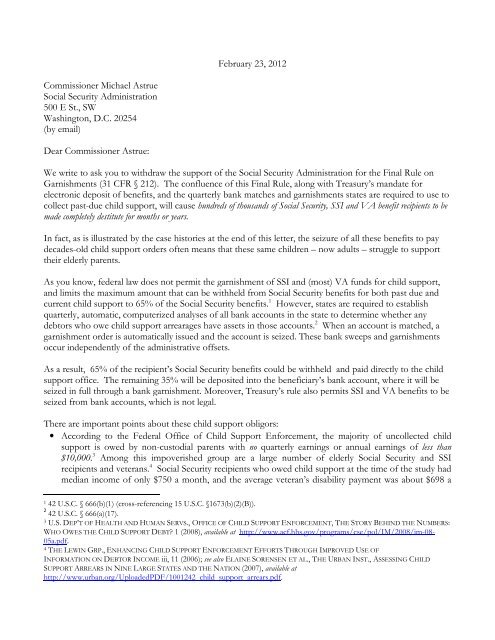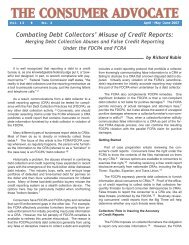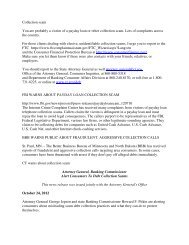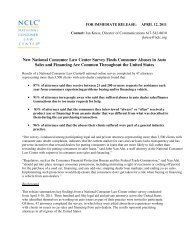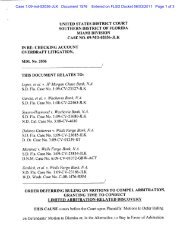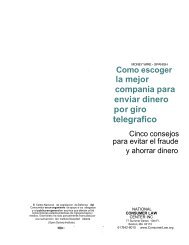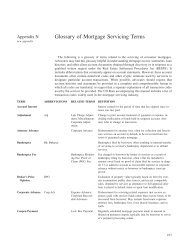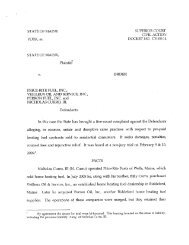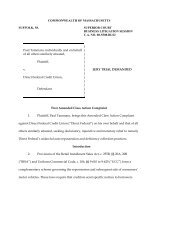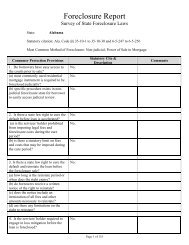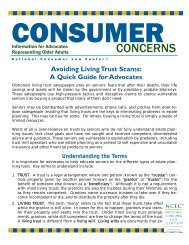Letter - National Consumer Law Center
Letter - National Consumer Law Center
Letter - National Consumer Law Center
Create successful ePaper yourself
Turn your PDF publications into a flip-book with our unique Google optimized e-Paper software.
Commissioner Michael Astrue<br />
Social Security Administration<br />
500 E St., SW<br />
Washington, D.C. 20254<br />
(by email)<br />
Dear Commissioner Astrue:<br />
February 23, 2012<br />
We write to ask you to withdraw the support of the Social Security Administration for the Final Rule on<br />
Garnishments (31 CFR § 212). The confluence of this Final Rule, along with Treasury’s mandate for<br />
electronic deposit of benefits, and the quarterly bank matches and garnishments states are required to use to<br />
collect past-due child support, will cause hundreds of thousands of Social Security, SSI and VA benefit recipients to be<br />
made completely destitute for months or years.<br />
In fact, as is illustrated by the case histories at the end of this letter, the seizure of all these benefits to pay<br />
decades-old child support orders often means that these same children – now adults – struggle to support<br />
their elderly parents.<br />
As you know, federal law does not permit the garnishment of SSI and (most) VA funds for child support,<br />
and limits the maximum amount that can be withheld from Social Security benefits for both past due and<br />
current child support to 65% of the Social Security benefits. 1 However, states are required to establish<br />
quarterly, automatic, computerized analyses of all bank accounts in the state to determine whether any<br />
debtors who owe child support arrearages have assets in those accounts. 2 When an account is matched, a<br />
garnishment order is automatically issued and the account is seized. These bank sweeps and garnishments<br />
occur independently of the administrative offsets.<br />
As a result, 65% of the recipient’s Social Security benefits could be withheld and paid directly to the child<br />
support office. The remaining 35% will be deposited into the beneficiary’s bank account, where it will be<br />
seized in full through a bank garnishment. Moreover, Treasury’s rule also permits SSI and VA benefits to be<br />
seized from bank accounts, which is not legal.<br />
There are important points about these child support obligors:<br />
• According to the Federal Office of Child Support Enforcement, the majority of uncollected child<br />
support is owed by non-custodial parents with no quarterly earnings or annual earnings of less than<br />
$10,000. 3 Among this impoverished group are a large number of elderly Social Security and SSI<br />
recipients and veterans. 4 Social Security recipients who owed child support at the time of the study had<br />
median income of only $750 a month, and the average veteran’s disability payment was about $698 a<br />
1 42 U.S.C. § 666(b)(1) (cross-referencing 15 U.S.C. §1673(b)(2)(B)).<br />
2 42 U.S.C. § 666(a)(17).<br />
3 U.S. DEP’T OF HEALTH AND HUMAN SERVS., OFFICE OF CHILD SUPPORT ENFORCEMENT, THE STORY BEHIND THE NUMBERS:<br />
WHO OWES THE CHILD SUPPORT DEBT? 1 (2008), available at http://www.acf.hhs.gov/programs/cse/pol/IM/2008/im-08-<br />
05a.pdf.<br />
4 THE LEWIN GRP., ENHANCING CHILD SUPPORT ENFORCEMENT EFFORTS THROUGH IMPROVED USE OF<br />
INFORMATION ON DEBTOR INCOME iii, 11 (2006); see also ELAINE SORENSEN ET AL., THE URBAN INST., ASSESSING CHILD<br />
SUPPORT ARREARS IN NINE LARGE STATES AND THE NATION (2007), available at<br />
http://www.urban.org/UploadedPDF/1001242_child_support_arrears.pdf.
month, 5 placing them below the poverty line. 6 The maximum federal benefit for an individual SSI<br />
recipient is now $698 a month. 7 Almost all of the children of these impoverished Social Security, SSI<br />
and veterans beneficiaries are now adults, so these payments will not be used to support children. 8<br />
Indeed, 80% of Social Security recipients are sixty-two and older, meaning their children are likely to be<br />
adults. 9 Among the 3.3 million veterans who receive disability benefits, almost two-thirds are over fiftyfive<br />
years old. 10<br />
• Much of the debt arose because the obligor never sought a “downward modification” of the original<br />
child support order when the obligor’s income decreased due to disability, job loss, or incarceration. 11<br />
Further, the amount due is generally significantly inflated due to interest and penalties imposed by the<br />
applicable state. 12<br />
• Finally, most of the debt is owed to the state, not to the adult children. Custodial parents with children<br />
on welfare are required to assign their right to child support to the state government. 13 Consequently,<br />
in California for example, 70% of the total child support debt is owed to the state, rather than to the<br />
custodial parent. 14<br />
As of March, 2013, all recipients of federal benefits must use electronic deposit, either through deposit<br />
directly into a bank account, or using the Treasury authorized Direct Express Card. 15 Direct Express cards<br />
will provide no protection from garnishment, as the Direct Express contract indicates that child support<br />
garnishment orders will be fully processed.<br />
This new mandate for electronic deposit is the precipitating factor for the damage. Currently, SSI, VA and<br />
Social Security beneficiaries can protect their benefits from the seizures triggered by the child support bank<br />
matches by continuing to receive paper checks. But as of March 1, 2013, paper checks will no longer be<br />
available, and recipients will have no way to protect their federal benefits deposited into bank accounts from<br />
child support garnishments – even when those benefits are what is left over after the 65% administrative<br />
offset, or when they are SSI and VA funds.<br />
Last year Treasury issued an Interim Final garnishment rule 16 which was intended to protect benefits in bank<br />
accounts from garnishment and to facilitate electronic deposit. The rule protects Social Security and other<br />
federal benefits from seizure to the extent they were electronically deposited within the two months prior to<br />
5 DEP’T OF VETERANS AFFAIRS, OFF. OF INSPECTOR GENERAL, REVIEW OF STATE VARIANCES IN VA DISABILITY<br />
COMPENSATION PAYMENTS REPORT iii (2005), available at http://www.va.gov/oig/52/reports/2005/vaoig-05-00765-137.pdf.<br />
6 Id.<br />
7 AUTOMATIC DETERMINATIONS, SSI 2012 available at http://www.ssa.gov/oact/COLA/SSI.html.<br />
8 THE LEWIN GRP., ENHANCING CHILD SUPPORT ENFORCEMENT EFFORTS THROUGH IMPROVED USE OF<br />
INFORMATION ON DEBTOR INCOME at 24-25. (2006).<br />
9 U.S. SOCIAL SECURITY ADMIN., FAST FACTS AND FIGURES ABOUT SOCIAL SECURITY 23 (2007), available at<br />
http://www.ssa.gov/policy/docs/chartbooks/fast_facts/2007/fast_facts07.pdf.<br />
10 DEP’T OF VETERANS AFFAIRS, A STUDY OF COMPENSATION PAYMENTS FOR SERVICE CONNECTED DISABILITIES 102 (2008),<br />
available at http://www.va.gov/op3/docs/ProgramEvaluations/CompPaymentStudy/DS_VOLUME_III_Chapter_V_VI.pdf.<br />
11 ELAINE SORENSEN ET AL., THE URBAN INST., ASSESSING CHILD SUPPORT ARREARS IN NINE LARGE STATES AND THE<br />
NATION AT 5 (2007), available at http://www.urban.org/UploadedPDF/1001242_child_support_arrears.pdf.<br />
12 Id. at 55.<br />
13 SUSAN WILSCHKE & RICHARD BALKUS, SOCIAL SECURITY ADMIN., CHILD SUPPORT PAYMENTS AND THE SSI PROGRAM, BRIEF<br />
NO. 2004-02 ( 2004).<br />
14 Kelley Weiss, High Interest Rate Driving State’s Child Support Debt, CAL. WATCH (Apr. 21, 2011),<br />
http://californiawatch.org/dailyreport/high-interest-rate-driving-states-child-support-debt-9929.<br />
15 31 CFR § 208.4.<br />
16 31 CFR § 212.<br />
2
the garnishment order; all funds over this amount are subject to seizure to satisfy the garnishment order.<br />
However, the Interim Final Rule allows garnishment orders from state offices of child support enforcement<br />
to trigger the immediate seizure of all of the funds in the accounts.<br />
We understand that a Final Rule on garnishment has been issued and is pending at OMB, and that this rule<br />
does not protect beneficiaries from complete impoverishment because of the automatic bank sweeps to<br />
satisfy past-due child support orders.<br />
Two examples illustrate the harm that the Treasury rule will cause if direct deposited federal benefits are not<br />
protected from child support garnishments:<br />
Wilbert W: Wilburt W. is 66-years-old and blind. 20 years ago, he lost his job as a maintenance man after a strong gust of<br />
wind blew closed the metal cover of a dumpster, striking him in the face. For the first time, he was unable to support his four<br />
children. He and his wife, Hyacinth, separated. While Mr. W went back to work as a security guard, his loss of income was<br />
so large that Hyacinth and the kids went on public assistance. In turn, child support orders were entered against Mr. W<br />
which he could not afford to pay. He was unaware that he could petition the court for a more affordable payment.<br />
In 2010, Mr. W’s wife, Hyacinth, has died. His children, now adults, are paying part of Mr. W’s rent because his<br />
Social Security payment - $775 a month – is not enough to keep their dad housed. Meanwhile, Mr. W still owes thousands of<br />
dollars in child support arrears.<br />
In October, 2010, New York’s Office of Child Support Enforcement (OCSE) garnished over $200 from Mr. W’s<br />
Social Security check. All of the garnished money was kept by OCSE for earlier welfare payments made for Mr. W’s children.<br />
After a few months, the garnishment proved too much. Mr. W was “borrowing” more and more from friends and his<br />
children to pay his rent. Eventually, Mr. W found a legal services lawyer who stopped the garnishment and restored the check<br />
to its full amount. New York, like most states, has a “self-support reserve” law that ensures a modicum of income for noncustodial<br />
parents who live below the poverty line.<br />
For a few months, Mr. W regularly received his check. Then OCSE’s bank match program caught him. As all<br />
states do, New York electronically searches for bank accounts belonging to fathers who owe child support, even when its decades<br />
old. When an account is matched, the child support computer automatically takes every cent.<br />
Four months after it restored Mr. W’s check to its full amount, OCSE computer again matched Mr. W’s bank<br />
account and took his entire Social Security check. Chase also took $125 in fees. Although the legal services attorney<br />
immediately intervened, it took three weeks for the account to be unfrozen. During that time, Mr. W was without any money,<br />
other than food stamps. He was unable to pay his rent and had to rely on his children for food.<br />
In July, 2011, OCSE matched this same account a third time, triggering another $125 in bank fees and the<br />
interception of his entire Social Security check. This time, OCSE took five weeks to return the money.<br />
Since September 2011, Mr. W gets his check in the mail. He pays about $7.00 to cash it at a cash checking<br />
store. He would prefer to bank as he doesn’t have to worry about the check being stolen. Thus his Chase account remains open<br />
in hopes that electronic banking will become safe for low income social security recipients. But in January 2012, his Chase<br />
account was frozen a third time by OCSE’s computers. Mr. W worries how he will live next year when mandatory direct<br />
deposit becomes effective.<br />
Cirillo C: In 1996, Cirillo C. was 39-years-old with a ninth grade education and four children, two of whom were<br />
minors. His wife and he were having problems. Subsequently, his wife went on public assistance and two child support orders<br />
were entered against him. Because Mr. C was having trouble finding and keeping a job, he did not pay any support for a<br />
number of years. But by 1999, the couple reconciled and Mr. C closed their children's public assistance case. Thereafter, Mr.<br />
C lived with and supported his family. Still, his child support order was not changed and his child support debt grew. After<br />
his kids were fully grown in the 2000's, $10,000 was garnished from Mr. C's wages while he worked as a preparer of airplane<br />
food.<br />
In 2008, at age 52, Mr. C suffered a heart attack and went on Supplemental Security Income.<br />
3
In December 2008 and May 2009, NY's OCSE twice garnished his bank account at Chase that contained only<br />
SSI. New York's garnishment notice instructs banks to ignore the order if the account contains only SSI, but Chase overlooked<br />
that part of the notice, as most banks do. Without any money, Mr. C and his wife turned to their adult children for food. In<br />
August 2011, his account was frozen a third time. Chase charged him $125 for freezing the account. Two checks then<br />
bounced, triggering $68 in fees. Three debit card purchases also were treated as overdrafts, triggering $102 in fees. Three weeks<br />
later, the bounced checks were resubmitted by the payee's bank, triggering two more Chase NSF fees of $68. While the account<br />
was frozen, ConEd threatened to seize Mr. C's electric meter because Mr. C had now defaulted on a payment plan. His kids<br />
paid that bill to keep their parents' apartment lit. By the time Mr. C located a lawyer to file an appeal, OCSE had taken<br />
$848 in SSI deposits. In addition, Chase had taken $378 in fees out of the next SSI check, leaving Mr. C with only<br />
$314. Although an appeal was filed with OCSE, it was denied. New York gives you only 15 days to file an appeal, and<br />
Mr. C's appeal was filed 32 days after the garnishment. In its denial letter, OCSE informed Mr. C that almost all the<br />
arrears were owed to the State. Meanwhile, Mr. C's children had to skimp on their own children's needs to pay their father's<br />
rent arrears.<br />
Since October 2011, Mr. C sends his SSI directly to a check cashing store that puts it on an Excella PrePaid Debit<br />
Card. Excella charges him $3 every time he uses an ATM , $2 every time he does a point of sale debit card purchase, and $3<br />
to write a money order. While he is careful about how and when he uses it, he still pays about $15 a month in debit card fees,<br />
about 2% of his SSI check. At Chase, he incurred no monthly fees or check writing charges because he had direct deposit. At<br />
Mr. C's request, an attorney contacted Excella to see if it gets garnishment orders, and the company informed the attorney that<br />
it does. As if to remind Mr. C of his vulnerability, his Chase account that had only a few dollars was garnished a fourth time<br />
by OCSE's computer in January 2012.<br />
This is wrong. While both current and past due child support orders should be paid, they should not cause<br />
the loss of 100% of Social Security or SSI and VA funds, resulting in the complete impoverishment of<br />
recipients.<br />
We only ask that the Treasury garnishment rule apply to child support orders. This would mean that two<br />
months benefits are protected, no more; all other funds in the bank accounts would seized to pay back-due<br />
child support.<br />
Please withdraw your support for the rule. For more information, contact Margot Saunders, <strong>National</strong><br />
<strong>Consumer</strong> <strong>Law</strong> <strong>Center</strong>, msaunders@nclc.org, (202) 452-6252, extension 104.<br />
Sincerely,<br />
<strong>National</strong> <strong>Consumer</strong> <strong>Law</strong> <strong>Center</strong> on behalf of its low-income clients<br />
NAACP<br />
<strong>National</strong> Veterans Legal Services Program<br />
<strong>National</strong> Senior Citizens <strong>Law</strong> <strong>Center</strong><br />
Bazelon <strong>Center</strong> for Mental Health <strong>Law</strong><br />
Sargent Shriver <strong>National</strong> <strong>Center</strong> on Poverty <strong>Law</strong><br />
<strong>National</strong> <strong>Law</strong> <strong>Center</strong> on Homelessness & Poverty<br />
<strong>National</strong> Legal Aid and Defender Association<br />
<strong>National</strong> Association of <strong>Consumer</strong> Advocates<br />
<strong>Consumer</strong> Action<br />
<strong>Consumer</strong>s Union<br />
<strong>Consumer</strong> Federation of America<br />
<strong>Center</strong> for Responsible Lending<br />
4
Bay Area Legal Services, San Francisco, CA<br />
Disability Rights Legal <strong>Center</strong>, Los Angeles, CA<br />
Elder and Health <strong>Law</strong> Clinic, Sacramento, CA<br />
Mental Health Advocacy Project, San Jose, CA<br />
Mental Health Advocacy Services, Los Angeles, CA<br />
Public Counsel, Los Angeles, CA<br />
Western <strong>Center</strong> on <strong>Law</strong> and Poverty, Sacramento, CA<br />
Connecticut Legal Services<br />
Greater Hartford Legal Assistance, CT<br />
Legal Assistance Resource <strong>Center</strong> of Connecticut, Inc., Hartford, CT<br />
New Haven Legal Assistance Association, New Haven, CT<br />
Jacksonville Area Legal Aid, Inc., Jacksonville, FL<br />
United Way of Tampa Bay, Tampa, FL<br />
Georgia Legal Services Program, Atlanta, GA<br />
Legal Assistance Foundation of Metropolitan Chicago, IL<br />
Health & Disability Advocates, Chicago, IL<br />
Cabrini Green Legal Aid, Chicago, IL<br />
CARPLS Legal Aid, Chicago, IL<br />
Economic Justice Project, Notre Dame <strong>Law</strong> <strong>Center</strong>, IN<br />
Legal Aid of the Bluegrass, Covington, KY<br />
Disability <strong>Law</strong> <strong>Center</strong>, Boston, MA<br />
Civil Justice Inc. of Maryland on behalf of its low and moderate income clients<br />
Maryland Legal Aid Bureau, Baltimore, MD<br />
Legal Services for the Elderly, Augusta, ME<br />
CALL, Clinton Township, MI<br />
Lakeshore Legal Aid, Southfield, MI<br />
Michigan Legal Services, Detroit, MI<br />
Michigan Poverty <strong>Law</strong> Program, Ann Arbor, MI<br />
Mid Minnesota Legal Assistance, Minneapolis, MN<br />
Mississippi <strong>Center</strong> for Justice, Jackson, MS<br />
MDC of Durham, NC<br />
Financial Protection <strong>Law</strong> <strong>Center</strong>, Wilmington, NC<br />
North Carolina Justice <strong>Center</strong>, Raleigh, NC<br />
Resources for Seniors, Raleigh, NC<br />
Legal Services of New Jersey, Edison, NJ<br />
BWICA Educational Fund, New York, NY<br />
Community Service Society of New York, NY<br />
Fifth Avenue Committee, Inc., Brooklyn, NY<br />
Legal Services of Central New York, Inc., Syracuse, NY<br />
Long Term Care Community Coalition, New York, NY<br />
MFY Legal Services, Inc., New York, NY<br />
Neighborhood Economic Development Advocacy Project (NEDAP), New York, NY<br />
New York State Wide Senior Action, New York, NY<br />
Staten Island <strong>Center</strong> for Independent Living, Staten Island, NY<br />
The Community Service Society of New York, New York, NY<br />
The Legal Aid Bureau of Buffalo, Buffalo, NY<br />
Ohio Poverty <strong>Law</strong> <strong>Center</strong>, Columbus, OH<br />
Pro Seniors, Inc., Cincinnati, OH<br />
5
Community Legal Services of Philadelphia, Philadelphia, PA<br />
MidPenn Legal Services, Lebanon, PA<br />
Northwestern Legal Services, Meadville, PA<br />
South Carolina Appleseed Justice <strong>Center</strong>, Columbia, SC<br />
Texas Legal Services <strong>Center</strong>, Austin, TX<br />
Legal Aid Society of Roanoke Valley, Roanoke, VA<br />
Virginia Citizens <strong>Consumer</strong> Council, Richmond, VA<br />
Virginia Poverty <strong>Law</strong> <strong>Center</strong>, Richmond, VA<br />
<strong>Law</strong> Line of Vermont, Burlington, VT<br />
Legal Services <strong>Law</strong> Line of Vermont, Burlington, VT<br />
Disability Rights Wisconsin, Madison, WI<br />
Mountain State Justice, Charleston, WV<br />
cc. Senator Max Baucus, Chairman, Senate Finance Committee<br />
Senator Herb Kohl, Chairman Senate Special Committee on Aging<br />
Congressman Dave Camp, Chairman, House Ways and Means Committee<br />
Congressman Sander Levin, Ranking Member, House Ways and Means Committee<br />
Congressman Barney Frank, Ranking Member, House Financial Services Committee<br />
Scott Frey, Social Security Administration<br />
Russ Young, Social Security Administration<br />
6


